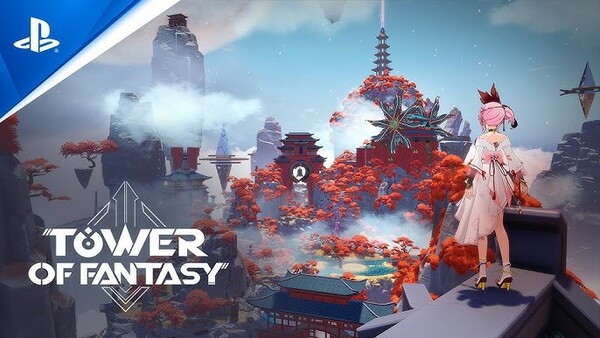Introduction
Tower of Fantasy is an open-world action RPG that blends vibrant sci-fi environments with fast-paced combat and exploration. Developed by Hotta Studio, it has drawn comparisons to Genshin Impact due to its gacha mechanics and stunning visuals. However, one issue that has sparked significant discussion in the player community is the game’s stamina system. This system, which limits how much content players can engage with daily, impacts the game’s core loop and has led to mixed reactions from players. This article will dive deep into how the stamina system in Tower of Fantasy influences player progression, exploration, and enjoyment.

1. Understanding the Stamina System in Tower of Fantasy
To begin, we need to understand the mechanics of the stamina system in Tower of Fantasy.
How Stamina Functions
In Tower of Fantasy, stamina is a resource that limits a player’s actions in various activities, such as combat challenges, dungeons, and world exploration. Players have a capped amount of stamina that regenerates over time. Once it’s depleted, players must either wait for it to refill or spend premium currency to continue playing high-reward content.
Stamina’s Role in the Game Loop
Stamina dictates how much in-game progress a player can make within a day. It acts as a gate, preventing players from rapidly advancing through the content or grinding for resources without breaks. For free-to-play players, this creates a pacing mechanism that ensures steady but limited progression.
2. Stamina as a Gatekeeping Mechanism for Content
The stamina system directly affects how players access high-level content in Tower of Fantasy.
Dungeons and Raids
One of the main uses of stamina is to participate in dungeons and raids, which provide rare loot and character upgrades. These activities are the cornerstone of endgame content, offering the highest rewards but also consuming the most stamina. Players who run out of stamina are forced to wait until it regenerates, which can be frustrating for those wanting to engage in long play sessions.
World Exploration and Gathering Resources
Stamina also impacts resource gathering. Collecting materials in the world, whether for crafting or upgrading gear, requires stamina. This adds an additional layer of management for players who must choose between using their stamina for dungeons or exploration.
3. How Stamina Restricts Exploration Freedom
Exploration is one of the most celebrated aspects of Tower of Fantasy, yet the stamina system curtails the player’s ability to freely roam and gather resources.
Limited Resource Farming
Unlike some other games that allow limitless exploration, Tower of Fantasy ties the ability to gather materials to stamina. This means that players who wish to fully explore the world for resources will often find themselves unable to do so once their stamina is depleted.
Reduced Sense of Discovery
Players are often incentivized to explore the map for hidden chests, rare creatures, and secret challenges. However, once a player’s stamina runs out, they can no longer interact with many of these elements, leading to a loss of immersion and the need to take long breaks from exploration.
4. The Impact on Player Progression
The stamina system doesn’t just impact exploration but is also deeply tied to how players progress through the game.
Slower Gear and Character Progression
Upgrading characters and gear in Tower of Fantasy requires materials that are locked behind stamina-restricted activities like dungeons and elite challenges. This design slows down progression for free-to-play players, creating a more measured and sometimes frustrating journey towards fully leveling up characters.
Pay-to-Progress for Faster Advancement
For players willing to spend money, the stamina system presents an opportunity to bypass these limits. By purchasing premium currency, players can refill their stamina, allowing them to continue farming for resources and completing high-reward activities without waiting. This has led to a pay-to-progress dynamic, where players who invest real money can significantly outpace those who don’t.
5. The Free-to-Play vs. Pay-to-Progress Dilemma
The stamina system reinforces a divide between free-to-play and paying players, raising concerns about fairness.
Free-to-Play Experience
For free-to-play players, the stamina system imposes hard limits on how much content they can experience daily. These players must plan their stamina usage carefully, deciding whether to focus on dungeons, exploration, or gathering resources. This system, while effective at pacing gameplay, can feel overly restrictive, especially during moments of high engagement when players want to grind for gear or progress through the story.
Paying Players: The Power of Flexibility
On the other hand, paying players have the flexibility to buy stamina refills, allowing them to bypass the restrictions. This creates an uneven playing field in competitive content, as players who spend money can progress more quickly and obtain powerful gear faster than free-to-play players, creating a noticeable disparity.

6. The Psychological Toll of Stamina Restrictions
The stamina system not only affects gameplay but also impacts the psychological experience of playing Tower of Fantasy.
The Fear of Missing Out (FOMO)
Stamina-based systems can induce a fear of missing out (FOMO), as players feel compelled to log in daily to maximize their stamina usage. Missing a day or running out of stamina prematurely can create anxiety around falling behind, especially in competitive content like leaderboards or timed events.
Burnout from Time Management
Managing stamina efficiently often requires players to be conscious of how they use their limited resource. For many, this adds an additional layer of stress, as they must ensure they are maximizing their time in-game while balancing other activities. Over time, this can lead to burnout, especially for players who feel they are constantly racing against stamina limits.
7. The Community’s Reaction to the Stamina System
The Tower of Fantasy community has had mixed reactions to the stamina system, leading to discussions and debates about its role in the game.
Criticism of Overly Restrictive Mechanics
Many players have criticized the stamina system for being too restrictive, particularly for those who wish to engage in longer play sessions. The limitation on how much a player can accomplish in a single day has been a source of frustration, especially for free-to-play players who feel their progress is artificially slowed down.
Defenders of the System: Balancing Content
On the other hand, some players defend the stamina system, arguing that it helps balance the game’s pacing and prevents burnout by limiting how much time players can invest in one sitting. This system ensures that players return regularly, giving the game longevity over time.
8. Comparisons with Other Gacha Games
Tower of Fantasy isn’t the only gacha game with a stamina system, but how does it compare to others in the genre?
Genshin Impact’s Resin System
Many comparisons have been drawn between Tower of Fantasy and Genshin Impact. In Genshin Impact, the resin system functions similarly to Tower of Fantasy’s stamina, capping the amount of high-reward content players can engage with each day. However, Genshin Impact offers more opportunities for exploration without consuming resin, allowing players to gather resources and complete puzzles even when they run out of resin.
Other Gacha Games with Time-Gated Progression
Other gacha games, such as Fate/Grand Order and Arknights, also feature stamina-like systems, though they are often less central to core progression. These games tend to focus more on character collection and less on stamina-driven content loops, giving players a bit more freedom in how they spend their time.
9. Possible Solutions to Improve the Stamina System
Given the ongoing discussions around the stamina system in Tower of Fantasy, several potential solutions could improve the player experience.
Increase Stamina Cap or Regen Rate
One of the most straightforward solutions would be to increase the stamina cap or regeneration rate. This would allow players to engage with more content in a single play session without drastically altering the game’s core loop. By increasing the stamina pool or the rate at which it refills, the game could provide more flexibility for players without making the system obsolete.
Introduce Non-Stamina-Based Activities
Another solution would be to introduce more non-stamina-based activities, allowing players to explore the world, gather resources, or participate in events without worrying about stamina. This would provide players with more to do during longer play sessions, reducing the frustration of hitting a stamina wall.
10. The Future of Stamina in Tower of Fantasy
As Tower of Fantasy continues to grow, the stamina system will remain a key point of discussion among players and developers.
Developer Feedback and Adjustments
The developers have already shown a willingness to respond to player feedback, and adjustments to the stamina system could be on the horizon. If the community continues to voice its concerns, it’s possible that future updates could introduce more leniency in how stamina is managed, creating a more balanced experience for both free-to-play and paying players.

Long-Term Impact on Player Retention
Ultimately, the stamina system will play a role in determining how long players stick with Tower of Fantasy. If the system remains too restrictive, it could drive players away over time, especially those who feel they are being held back by artificial limitations. However, with the right adjustments, the stamina system could help ensure the game maintains a healthy balance between progression and player enjoyment.
Conclusion
The stamina system in Tower of Fantasy has sparked debate over its impact on exploration, progression, and player experience. While it serves as a pacing mechanism that ensures long-term engagement, it also imposes limits that can feel restrictive, particularly for free-to-play players. As the game evolves, finding the right balance between rewarding progression and maintaining fairness will be key to its continued success.


